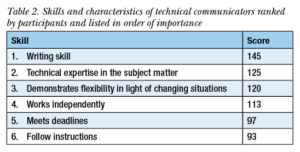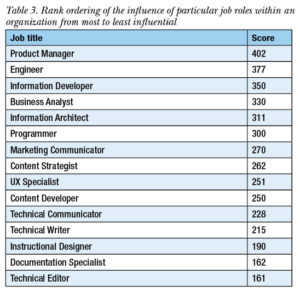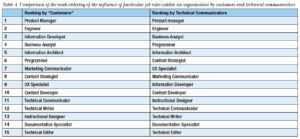by Saul Carliner | STC Fellow and Yuan Chen

What makes an effective technical communicator? And do technical communicators meet these expectations?
This article explores these and other questions. Specifically, it reports
- Customer expectations of technical communicators in their own words (customers are the internal or external groups that pay for technical communication services)
- The extent to which technical communicators meet those expectations
- Customer rankings of six major qualifications for technical communicators.
This article also reports on how customers see technical communication roles within the larger schemes of their organizations.
Expectations When Working with a Technical Communicator
Participants described a variety of skills, knowledge, and abilities that they expect in technical communicators.
The most common expectation is that customers expect technical communicators to understand the product or subject about which they are writing. Nearly a third of all participants commented on this. When commenting on this, some participants specifically added the “use case” for the product or subject.
Several participants commented on subject matter expertise in a general way, such as “Someone who knows about the product they are a technical communicator for” and an “understanding of what we are trying to convey to the customer in our tech documents.”
Some participants specifically suggested that technical communicators needed to learn about the subject independently. “I would love for them to understand the feature we’re putting in, and the client need it’s fulfilling.”
Other participants expect technical communicators to synthesize material from several sources. “I expect the technical communicator to be sufficiently knowledgeable about the company’s products and documentation to analyze and blend multiple inputs to achieve the best results.”
Still other participants noted that technical communicators need to learn about the subject quickly. “I expect ‘right the first time.’ I never mind explaining something to someone who needs the info, but explaining it a second time is very frustrating. Sure, there can be debate or nuances about [how] best to write something, but I expect technical communicators to be able to get the majority of the understanding on the first pass, and only have tweaks to discuss with SMEs at that point.”
The second most common response focused on the ability to produce “professional” materials. For some participants, that focused generally on creating content. “Let me give you a process map or outline of information and you build the procedure for me to get it started. I can revise/fill in the blanks.”
But the majority of responses in this category focused more on copyediting and production issues, such as “superb proofreading and adequate content creation,” “strong organizational skills and a good grasp of editing software/tools,” and “help with grammar, clarifying of ideas, and overall competency of document[ation].”
And one participant noted that they “expect assistance in assuring my documentation looks more polished. I also expect that what I write or the material I provide has a consistent style with other communication in the organization. I also expect that it adheres to standards such as accessibility and can be translated appropriately to other languages.”
Eight of 33 participants offered a third category of expectations: Characteristics of a technical communicator. These included:
- “Intellectual curiosity” (two mentions)
- “Team player” (two mentions)
- “Comfortable and confident with their role and capabilities”
- “Knowledgeable and helpful, with right approach to demonstrate and teach”
- Independence—”[someone who can write] without someone else telling them what to write”
- “Technically proficient, excellent communicator, team player”
- “Up to date on latest communication/teaching techniques and tools”
The fourth most common expectation of technical communicators sought by participants is the ability to translate technical information from those who know to those who need to know (the definition of technical communication offered by Barnum and Carliner in their book, Techniques for Technical Communicators).
The majority focused on the actual act of transforming material intended for a subject matter expert to an approach suitable for the intended users, such as “someone who can translate technical processes to easy to use instruction for the uninitiated” and “someone who has the ability to take my technical knowledge and translate that into understandable technical communication.”
Participants also expected technical communicators who can “translate engineer speak into English” and “someone who is able and interested in working within the team to document changes and new functionality.”
But some participants expect technical communicators to go further: “Not only describe mechanically what to do on the screen, but explain why the customer should use this piece of the product, how it will help them, what things to look out for, how to debug issues, etc.”
Other characteristics sought include:
- “User centric approach”
- “A vision for the overall purpose of the project”
Participants also expected strong customer service, such as someone who “preps to work with experts,” provides “quick responses,” and gives “a reasonable time frame, appropriate to the magnitude of the task, to review the documentation,” as well as someone who “will be open to constructive input.”
How Technical Communicators Meet Those Expectations
The previous section stated the expectations, but to what extent do technical communicators meet them? According to participants, technical communicators usually or always do (72.7%). Less than 10% of participants feel that technical communicators rarely or never meet these expectations.
Table 1 summarizes the responses.

Most Important Skills and Characteristics for Technical Communicators
Participants were asked to rank order six skills and characteristics deemed important for technical communicators to possess. Table 2 shows the results, listing the skills and characteristics in order of importance.

Technical Communicators’ Rank in the Organization
To get a sense of how they perceive the status of technical communicators within the larger organization, participants were asked to rank and order fifteen job titles in terms of their influence within an organization, from most to least influential.
Although customers ranked product managers and engineers as the two with the most influence, their third most influential position offered a bit of a surprise: Information developer, a title for technical communicators introduced in 1981 by IBM that has fallen out of use in the past decade or so. The job titles Information Developer and Information Architect both outranked Programmer in terms of influence.
Also noteworthy are the rankings of jobs associated with technical communication. Below Information Developer and Information Architect, next came Content Strategist, UX Specialist, and Content Developer. Although STC has spent a lot of effort distinguishing between a Technical Communicator and a Technical Writer in the past several decades (including an effort to reclassify the job at the U.S. Bureau of Labor Statistics), customers had nearly identical perceptions of the influence of the two job titles.
Ranked lowest were Documentation Specialist and Technical Editor. Among related communication disciplines, Marketing Communicator ranked a bit higher than job roles associated with technical communication while Instructional Designer ranked near the bottom.
Table 3 lists the ranking of all these job titles by participants.

If this list of job titles looks familiar to readers of Intercom, it’s because technical communicators were asked to rank the same job titles in the 2018 Census of Technical Communicators. Although some of the rankings differ substantially between the two groups (for example, views on the influence of Information Developers and Instructional Designers differ among the two groups), the top and bottom two rankings are identical, suggesting some alignment between technical communicators and their customers on the influence of particular roles within organizations.
Table 4 compares the two rankings.
 Conclusion
Conclusion
As suggested by both the expectations of technical communicators and the rank ordering of skills and characteristics, technical communicators need both excellent writing skills and strong subject matter expertise. This tension between writing skill and technical prowess is the core tension in this line of work. The ideal technical communicator needs both but, if pressed, writing skill could be more important.
Almost as important, however, are customer service skills of meeting deadlines, following instructions, and treating sponsors, SMEs, and others in the customer’s organization with respect.
SAUL CARLINER (saulcarliner@hotmail.com) is a professor of educational technology at Concordia University in Montreal, a past editor of the IEEE Transactions on Professional Communication, and a Fellow and past president of STC.
YUAN CHEN (yuan.chen@mail.concordia.ca) is a PhD candidate in educational technology at Concordia University, where her research focuses on the perceptions of instructional designers in higher education held by the faculty who work with them. She is also an instructional designer at Carleton University.


